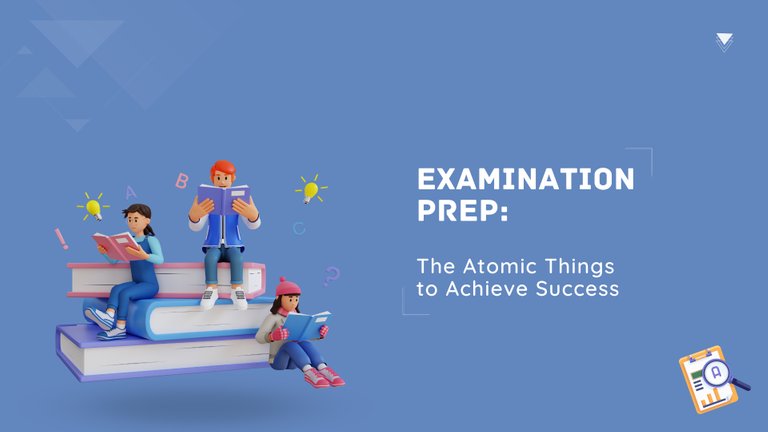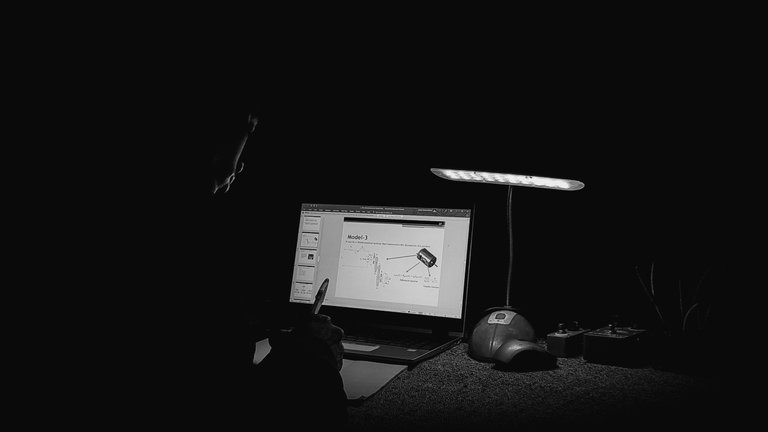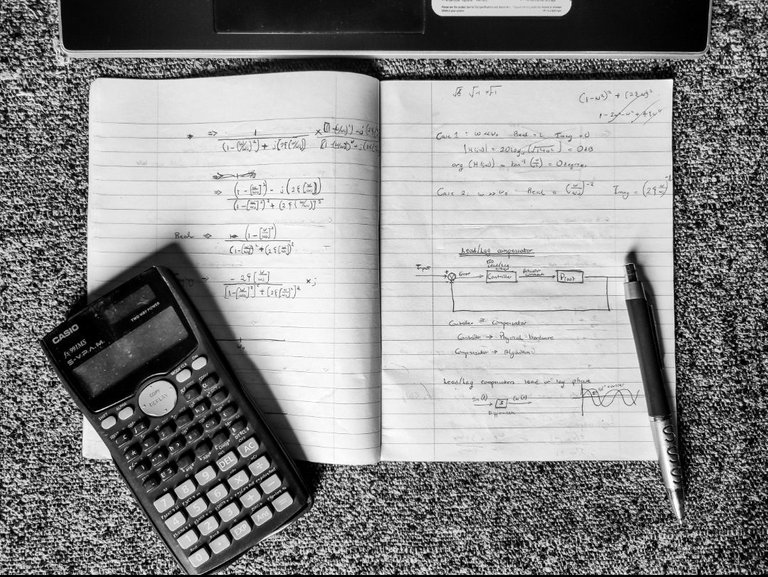Examination Prep: The Atomic Things to Achieve Success
Recently, I spent a few days creating my final memories as an undergraduate student at my university. This signifies not only that I have graduated but also that I am now a new graduate with numerous stories to share. However, in retrospect, these memories are not entirely novel, as some of them are common to most university experiences, especially those on this side of the world. Therefore, I will be sharing my experiences related to examinations.

When it comes to matters of exams and preparing for them, I wasn't much of an avid planner for my academics when I first started out in school. But as a result of my performance then, I changed my attitude towards my academics and began to consider better strategies.
In as much as we would like to view the education system we have now as "flawed," especially with the fact that the majority of what we do is basically memorize, even without understanding sometimes, we can all agree that the first step to actually learning something is to believe we can learn it; otherwise, it would be a rather tedious process of stuffing our brains with information.
Starting out early
I naturally found it quite challenging to spend the last few minutes (or hours) preparing for an examination. This is because I not only have to study weeks' worth of materials previously provided in such a short time but also have to do the same for other courses within that same time frame. It is that time when I would be expecting this tiny brain of mine to absorb all the necessary information (sometimes everything) and then provide it from some imaginary storage device I might have somewhere in my head—what a fantastic ambition!

In order to better position myself to "remember" all that I may have studied, I try to ensure that there is a lot of time to study and enough time to cement what I have studied into my brain. "Repetition is the mother of learning," they say. And the more I practice what I've learned, the easier it is to remember it; it may even become second nature for as long as I revise it.
The volume of material to cover and the complexity of its subject determine how much time it could take to really "master" its content. One's mindset is a large contributor.
Believing in oneself
Throughout my school years, I used to tell myself, "Nothing is impossible to learn if I completely believe I can learn it and put my mind to it." This eliminates any cognitive bias I may have had about a course based on previous performances I am aware of or the collective negative perception of my colleagues that could affect me.

It has happened twice, at least, when I would be the only one to score an A in a particular course. And this is not because I had an upper hand or something of the sort; it is because I dedicated special attention to those particular courses and adequately treated them. In the end, it always paid off.
I practically applied this to generally any course that may seem "challenging" and had good results in it. Of course, getting started as soon as possible helps a lot.
Just do it
Part of my first mistake in my first year was that I failed to assess and understand what works for me, and that includes the matter of "timetables." I do not mean lecture timetables, but study timetables.
At first glance, it does sound like a good idea to have a timetable, as it would seem one is on the right path to success, but in my experience, it puts me in a rather rigid or inflexible position. And as we all know, not everything happens the way we plan (or expect), and that often requires us to be "flexible" in our plans. That is, imagining potential flaws and developing realistic plans to adequately maneuver efficiently.
For example, I could be taking 10 courses in a semester. And so to "ensure that I am up-to-date with those courses," I tried to allocate them specific hours of the week (and day) to study them. But when life and its contingencies began to take their course, the plan became more glaringly ineffective, as things fell apart easily when plans changed even the slightest bit, like moving a morning lecture to be held in the evening instead.

Rather than just "find the perfect time" to study, I opted for the mantra "Just do it." And although I still had a subconscious plan for what to study, it was primarily based on lectures. I simply read whenever and wherever I had the opportunity.
For example, if I have Physical electronics in the morning at 9 a.m., I would get to the lecture room at least an hour earlier to study. If that place wouldn't be convenient for me to study at that time, I would just pick some other place or corner to study a bit. And then I would do something similar after lectures: study with the little opportunity I had. This includes burning the midnight candle too, but only for a short time, say, one or two hours.
Using Active Learning
Taking notes is how I ensure that I am learning and comprehending. When I study, I always take notes, except when I am being lazy, and that never pays. This makes committing things to memory much easier and more efficient. However, there is a difference between writing down what one had just read a few minutes ago and actually creating a "physical mind library."

In my experience, writing what one had seen or read a few seconds ago, or even minutes ago, does not essentially prove that one has that information committed to memory. Rather, one could engage with the material by doing things like summarizing information in one's own words, and practicing problems frequently.
Buckling up
The importance of rest during examinations is often underestimated. And, as much as it may appear that there isn't enough time to sleep when there are topics to cover and all, not getting enough sleep reduces one's efficiency significantly.
This is why the aforementioned points are crucial for examination preparations. They are the preliminary things to be done leading up to the time for the examinations so as to allow one to observe the necessary steps to perform efficiently.

There once was a time that I had deprived myself of sleep for about a week, and then on the eve of an examination, Electrical Machines 1, I couldn't even process anything in my brain. Sleeping was difficult, and reading felt impossible. If it hadn't been for the fact that I had been reading that course for a long time coming, I wouldn't have performed as well as I eventually did, despite the struggle to prepare one last time.

To summarize, exam preparation does not begin the night before or a few days before the exam, but rather from the start of the semester. The little things we do, the atomic habits, determine the future of one's performance.
- Start out early so as to avail one with enough time to cover a lot.
- Keep the mind open to learning, regardless how seeming difficult.
- Life's not straightforward. Just do it whevever you can.
- Actively engage with the materials for efficient learning.
- Do not underestmate the power of good rest.

ℍ𝕖𝕪, 𝕚𝕗 𝕪𝕠𝕦 𝕖𝕟𝕛𝕠𝕪𝕖𝕕 𝕥𝕙𝕚𝕤 𝕡𝕠𝕤𝕥, 𝕜𝕚𝕟𝕕𝕝𝕪 𝕝𝕖𝕒𝕧𝕖 𝕒 𝕔𝕠𝕞𝕞𝕖𝕟𝕥, 𝕣𝕖𝕓𝕝𝕠𝕘, 𝕠𝕣 𝕦𝕡𝕧𝕠𝕥𝕖. 𝕀𝕥'𝕝𝕝 𝕤𝕦𝕣𝕖 𝕓𝕖 𝕒𝕡𝕡𝕣𝕖𝕔𝕚𝕒𝕥𝕖𝕕.

Hi @olujay,
I can relate to your experiences with exam preparation, especially the feeling of trying to cram everything into your brain in the last few minutes or hours before the exam. It can be overwhelming and quite stressful. However, I agree with your statement that "repetition is the mother of learning." Taking the time to study early and frequently can make all the difference in retaining information.
Regarding study timetables, I completely agree with your "just do it" mentality. While it's important to have a plan, being too rigid can hinder our ability to adapt to unexpected changes. Finding ways to study whenever and wherever possible can be much more effective, especially with a busy schedule.
I do feel overwhelmed by the lot that I have to do in last minute when I did not prepare well. So, to avoid that, I figured it's just best I prepare early enough.
Thank you fro your contribution.
https://twitter.com/906146874/status/1627984061644906497
The rewards earned on this comment will go directly to the people( @olujay ) sharing the post on Twitter as long as they are registered with @poshtoken. Sign up at https://hiveposh.com.
This post has really been helpful.
Thank you for sharing! ✨
I'll surely adopt a thing or two from this post.
I am glad you found it helpful.
Wow! I was like amazed reading your blog tonight. This is very practical and applicable to all students. Thus, I believe starting early to review notes is an effective one because I, myself did it as well. Actually, you can remember and get a good score when you do writing a note than just reading them. !PIZZA
You totally can relate to how effective it is when one takes good notes when they are studying.
I wonder, are you done with the university?
Thank you for reading, and your kind words too.
Who are they? Well, whoever they are. They are absolutely right.
What a comprehensive explanation on the subject!
Starting out early is the best strategy. Especially, for university education each day and hour has its unique importance. Loss of a day makes a big loss at the end.
I agree to the point that good rest before exam is crucial. Sleep deprivation makes our body and mind lethargic. We need to recharge us before giving the performance
Oh yes, they are!
In the university, every second counts. There are always a lot to do and deal with, so facing them on time can really help one thrive.
I once failed to understand the lethargy that comes with sleep deprivation and that made me less efficient with my performance. Now that I know better, I am doing better.
Thank you for your insighful contribution. How are you and your kids?
Sleep deprivation comes with serious problems. I start have GIT problems besides other lethargies.
I and my kids are doing well. Thanks for asking 💜
What is GIT? And did sleep deprivation cause it?
Oh GIT! It means Gastrointestinal Tract.
The first thing I get is nausea. Other consequences include lack of appetite, heartburn and acidity
Exactly, when we do not be prepared for exams from the start, we can't do it until the paper appears before our eyes and we blame the little amount of time or we become sick due to the tension of exams.
The thing about our brains is that we need suffient time spent on repetition of information to keep information stored in our memories. Therefore, studying just few hours before the examinations never do the trick.
Yeah, it is like arranging our bedroom or throwing luggage in a storeroom.
Of course, we can't easily separate all garbage sitting in the examination hall.
That's why we should take time to place all knowledge separately and revise it again to remove dust from it🤭😊😊.
You get the idea. One just needs enough time to let it all settle.
I agree with you 100% especially with that aspect of starting out early. I just find it hard to do so lol.
Well, what I do to cover for that is to always be present in class and this helps my ate study to a great extent.
Good points... Atomic indeed, thanks for sharing Jay 🙂
Posted Using LeoFinance Beta
Really, starting out early can be tricky to do, especially when your body feels like there is still a whole lot of time too study in the semester. The thing, however, is that every second counts. But you are a graduate now, Merit.
I don't think I have missed lectures up to 10 times in all of my time in school. I was always present, and that always aided my study.
Haha we're both graduates, finally! 🙂
Is nor easy lol
Attending lecturers helps a lot in studying for an exam, tested and trusted hehe
https://leofinance.io/threads/@mhizsmiler.leo/re-leothreads-s3dvkjhk
The rewards earned on this comment will go directly to the people ( @mhizsmiler.leo ) sharing the post on LeoThreads.
Taking notes doesn't necessarily mean your writing exactly what's on your book. I prefer taking notes when studying because it helps me remember that particular area of research and it helps develop the mind. and helps give the mind a mental Library
Yeah, that's exactly what I meant. I wonder. For you, if you don't take notes, what happens?